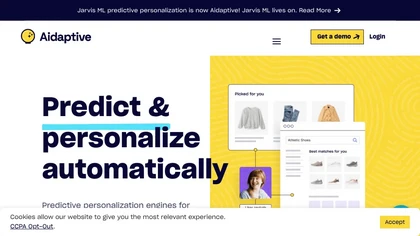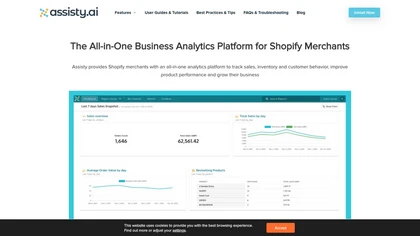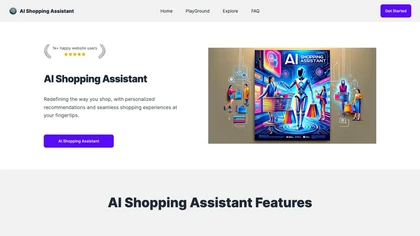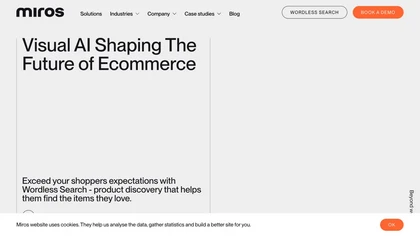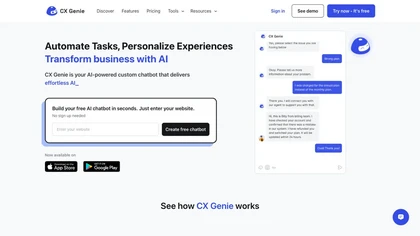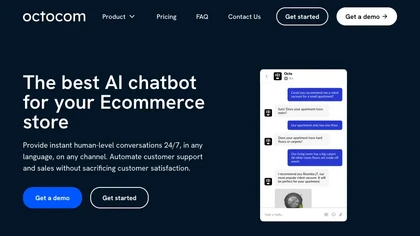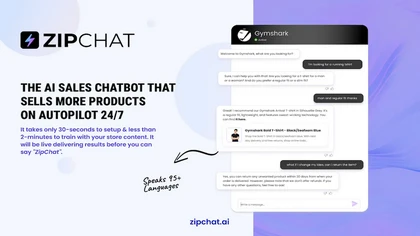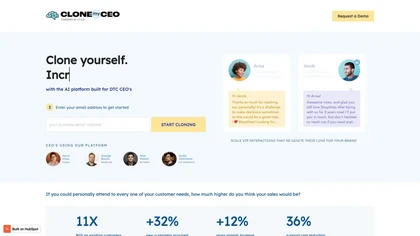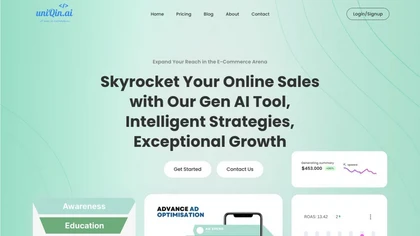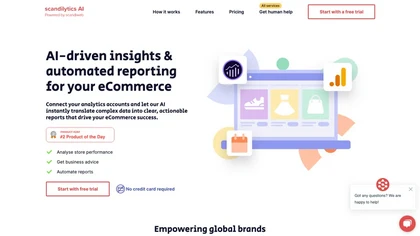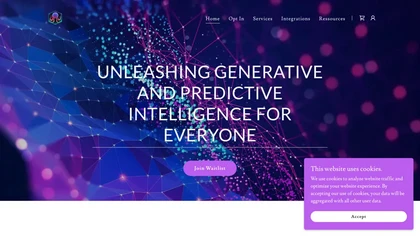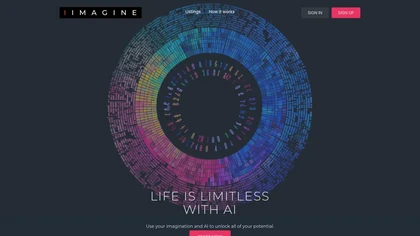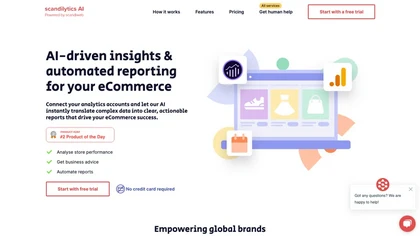AI use cases for E-commerce
Generative AI can be applied in various applications for e-commerce. Here are some examples to explore below for inspiration with AI tools to get you started with using AI in e-commerce.
🛠️ 70 AI tools for E-commerce
Explore a dynamic list of some of the most popular tools to get you started with various AI use cases and applications for E-commerce to streamline your workflows and productivity today.
Aidaptive features
- Recommendations
- Pricing
- Search
- Merchandising
Potions features
- Personalized product recommendations
- Smart sorting of list pages
- Cookie-free personalization technology
- Seamless integration
- Real-time performance monitoring
ConsumerAI features
- Product recommendation
- Ai based
- Question
- Problem solving
Acobot features
- Assisted shopping
- Lead generation
- Cart recovery
- Email marketing
- Conversational UI
Infichat features
- Instant product discovery
- Personalized recommendations
- Seamless customer support
- Maximize conversion rates
assisty.ai features
- Retail chatbot menu tool
- Generating inventory and sales reports
- Exporting data and creating custom dashboards
- User-friendly pre-built reports
- Advanced data drill-down and automation capabilities
Maverick features
- Personalized video generation
- Massive scale
- Ecommerce revenue boost
- Ltv increase
- Ai-generated video
🔥
Create your account, save tools & get personal recommendations
Receive a weekly digest of our handpicked top tools.
Unsubscribe anytime
HeiChat features
- AI chatbot plugin for e-commerce websites
- Powered by ChatGPT
- Compatible with Shopify, WooCommerce, Shopline
- Customizable chatbot with preview functionality
- Offers features like instant answers, product recommendations, multilingual support
Innosearch AI - Shopping Assistant features
- product discovery
- NLP based search
- real time eCommerce recommendations
- eCommerce data and expert insights
V-retail features
- Simulates in-store personalized experiences online
- Engages potential customers through live chat, voice, video calls, and remote assistance
- Provides real-time conversations
- Offers advanced analytics insights
- Seamlessly integrates with existing websites across devices and operating systems
Shopifinity Engine™ features
- Utilizes Shopifinity Engine™
- Automates tasks like content creation and sales support
- Personalized marketing campaigns based on detailed customer data
- Suresell AI for boosting sales
- ConsistentVoice for maintaining brand tone
ShopMate features
- AI ChatGPT-powered virtual assistant
- Personalizes recommendations
- Upsells/cross-sells
- Engages customers in real-time
- Available 24/7 for customer inquiries
RevoChat features
- Personalized assistance
- Product suggestions
- 24/7 availability
- Integration with Shopify and WooCommerce
- User-friendly interface
Luigi's Box features
- AI-powered search functionality
- Advanced CEE language support
- API integration for data exchange
- Dynamic search filters for relevant results
- Personalized product recommendations
Asinstant features
- Personalized AI chatbots
- Automated processes
- Streamlined workflows
- Custom-built data automations
- Deployment, integration, and ongoing client support
Shopmate Chat features
- Personalized product recommendations
- Intelligent customer support
- AI-powered product discovery
- Customizable branding
- Integration with popular e-commerce platforms
AIShoppingAssistant features
- Personalized recommendations
- Price comparison alerts
- Virtual try-on with augmented reality
- Voice-text interaction
- Enhanced shopping journey
crossingminds.com features
- Data enrichment with intuitive tags and properties
- Personalized product recommendations for various industries
- Behavior-based approach to recommendations
- Seamless integration with existing tech stacks
- Driving cross-selling and upselling opportunities
ZBots features
- Customizable chatbot training using company data
- Multilingual conversational AI capabilities
- 24/7 availability for engaging with visitors
- Advanced conversational features for guiding users
- Cost-effective monthly fee model
Miros features
- Visual AI technology
- Wordless search browser
- Product discovery
- Buying intent recognition
- 2-step integration
powered by ChatGPT features
- Build and deploy intelligent chatbots without coding
- Automate FAQs and provide 24/7 support
- Personalize customer experiences and interactions
- Advanced features like intent detection and AI recommendations
- All-in-one chatbot solution for managing, analyzing, and personalizing chatbot ecosystem
Gensbot
5Gensbot features
- Instant creation of personalized goods
- Generation of customized catalog based on user preferences
- Sustainability focus in AI designs
- Local production to minimize carbon emissions
- Token rewards system for unlocking future designs and exclusive offers
Octocom
4.8Octocom features
- Product recommendations
- Upsell
- Handles 90% of support tickets
- Increases sales
- Improves customer experience
Gigalogy Personalizer features
- Sentiment analysis
- Speech-to-text
- Text-to-speech
- Fraud detection
- Recommender systems
SaaS Library features
- Product idea generation
- Market strategy development
- Revenue model analysis
- Persona insights
Chart features
- Ml inference
- Cloud based
- Own
- Lightning
Productscope.AI features
- Voice of customer analytics
- Amazon listing optimization
- Ai product photoshoot
- Ai seller chatbot
Saara.io features
- Focus on solving common industry challenges
- Reduce operational costs
- Analyzing customer data for personalized offers and improved shopping experience
Personaliz.ai features
- Voice and lip movement cloning
- Personalized message generation
- Placeholder replacement
- Interactive video experiences
- Seamless integration with existing tools
ezML features
- Zero-shot learning
- Text-to-model capabilities
- Prebuilt vision pipelines
- Effortless deployment and integration
- Rapid inference support
ulai features
- Conversational commerce platform
- Multi-channel customer engagement
- Gen-ai product discovery and recommendations
- Automated post-purchase processes
- Real-time actionable data analytics
CartBuddyGPT features
- GPT-powered shopping assistant
- Product recommendations based on needs and budget
- Built-in plotting and visualization tools
- Price comparisons and product ratings
- Expert recommendations based on analyzed data
Outfits AI features
- Generate outfits
- Recommend outfits
- Create outfit plans
- Suggest accessories
- Provide style advice
Scribfy features
- Automated content generation
- Text refinement and editing
- Background image creation for products
- SEO analysis for keyword optimization
- Customizable content generation experience
Intellimize features
- Personalized marketing
- Website optimization
- Machine learning
- Conversion acceleration
- Faster results
Zipchat
5Zipchat features
- Create custom chatbot
- Offers accurate bot responses
- Advanced scrape technology
- Increase customer satisfaction
- Boost sales
RecurAI features
- Compose
- Send
- Receive
- Converse
- Communicate
Shaped features
- Personalized recommendation system
- Real-time recommendation generation
- Industry-specific recommendations
- User engagement analysis
- Easy-to-use api tool
Ecommerce Prompts features
- Generate ecommerce-related chatgpt prompts
- Utilize expertise of ecommerce experts in creating prompts
- Produce readymade ideas for chatgpt prompts
- Collaborate with prompt engineers to develop effective prompts
Chaperoned features
- User-friendly interface
- Personalized chatbot interactions
- Customizable chat experiences
- Integration of funny parody characters
- Efficient navigation
Yepp features
- Individually tailored AI responses
- Integration with team processes
- Marketing intelligence
- Data retrieval and analysis
- Automating Tedious Marketing Tasks
Expert robot pro features
- Chatbot assistant
- Text generator
- Image generator
- Code generator
- Voice chat services
Elastic Bot features
- Automated customer support
- Conversational commerce
- Multilingual capabilities
- Omnichannel engagement
- Integration of human agents and automation
Clone My CEO features
- Personalizing customer interactions
- Optimizing revenue streams
- Automating email sequences
- Utilizing deepfakes and voice memos for scale
- Identifying optimal product segments
uniqin.ai features
- Automated analysis and reporting
- Real-time insights for informed decisions
- Advanced analytics for deeper market understanding
- Data-driven strategies for performance tracking
- Amazon ads optimization
Recommendix features
- Interactive quiz features
- Quiz creation without programming knowledge
- Advanced analytics and action plan
- Wide range of integrations (Shopify, Google Analytics)
- Customization of widgets for seamless integration
Chatling features
- Reduce support volume
- Instantaneously answer customer queries
- Train chatbots based on website content
- Boost deflection and resolution rates
- Customize chatbot branding
Buysmart features
- Personalized recommendations
- Advanced algorithms
- Tailored suggestions
- Decision-making analysis
- Efficient shopping experience
enterprisebot.ai features
- Conversational AI capabilities
- Automation for customer and employee support
- Contextual information processing
- Personalized recommendations
- Integration with existing tools and systems
RapidAI features
- Customized AI tools
- Streamline operations
- Reduce costs
- Range of powerful AI tools
- Optimize work
Botsnap features
- Platform for creating custom AI assistants
- Personalized recommendations based on user preferences
- Round-the-clock support
- Seamless integration
- Valuable analytics insights
Adereso features
- Seamless communication across various channels
- Natural language processing capabilities
- Integration with CRM systems and e-commerce websites
- Streamlining operations
- Real-time performance metrics monitoring
BHuman features
- Personalized video generation
- Customer connection
- Scaleability
- Realism
- Ai technology
Saas With AI features
- Image upload for analysis
- Object recognition
- Scene recognition
- Text recognition
- User-friendly interface
Instantanswers features
- Chatbot Training
- UI customization
- Easy embedding
- Conversation analytics
- Export data
Presbot features
- Powered by ChatGPT
- Lead generation through targeted questions
- Retargeting capabilities
- Real-time analytics
- Seamless integration with multiple platforms
DigitalGenius features
- Instant problem resolution
- Product defect identification
- Personalized responses
- Seamless platform integrations
- Efficient customer service task automation
Chatwith features
- Custom AI chatbot creation
- Training chatbot using website content, files, and videos
- Performing specific tasks
- Connecting with over 5000 apps via API integrations
- Offering multi-language support
Data Analyst AI features
- Data Analyst AI
- Automated reporting
- Tailored marketing strategies
- Streamlined marketing efforts
- Secure data processing
Botb9 features
- No Code AI Chatbot Embeddable
- Custom Trained Chatbot
- Lead Capture and Order Checkout
- Video Guide Integration
- Unlimited Chats
Predict Expert AI features
- Crafting unique AI models
- Integrating intelligent applications and APIs
- Tailoring AI models and applications to address specific business needs
- Real-time operational insights
- Monitoring performance in real-time
Glov features
- AI supervised mini-robots
- Market-tested
- Copy Rewriter feature
- Social Badger feature
- Behavior Graph
Manifest AI features
- Product recommendation
- Natural language processing
- Customization
- Purchase decision support
- Multilingual
Botjet features
- Conversational Flow Designer
- Natural Language Understanding
- Debugging Console
- Pre-Built Knowledge Bundles
- 3rd Party Intent Engine Support
DropbotAI features
- Streamline product testing process for dropshipping businesses
- Simplify product and creative testing with proprietary AI technology
- Provide winning ideas and angles to enhance marketing strategies
- Generate over 20 outputs including marketing strategies and ad campaigns
- Intuitive dashboard and quick output generation for efficiency
I IMAGINE features
- Specialized AI chatbots
- AI writing tool
- AI image generator
- Speech-to-text feature
- Custom chatbot creation
Scandilytics features
- Advanced analytics for store performance insights
- Business advice based on data analysis
- Automated reporting processes
- Connection with analytics accounts for data translation
- AI-based trend analysis and opportunity identification
Webbotify features
- Supercharge visitor engagement
- Offer a chatbot powered by chatgpt
- Reduce support volume
- Enhance customer engagement
- Provide personalized conversations
YourGPT features
- Customizable chatbots
- Knowledgebase experts
- Content masters
- Personal assistants
- Fine-tuning options for openai models
CustomChat features
- Easy-to-use chat interface
- Multiple AI chatbot models integration
- Text and image generation
- Project organization features
- AI assistants for better conversation results
